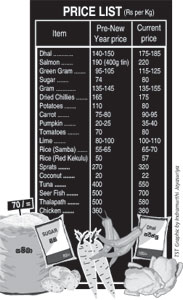New import taxes, the increase in the Nation Building Levy and the depreciating rupee are sending the prices of essential food items skyrocketing with no relief available for consumers even at the state-run ‘eonomic centres’ to provide goods at a cheaper rate.At the Welisara Dedicated Economic Centre and other “economic centres” in Narahenpita and Pettah, traders told The Sunday Times the depreciating rupee and the increase of the Nation Building Levy (NBL) from 1% to 3% effective from May 1 had forced them to revise their prices.
At the near-deserted Welisara “economic centre” many traders complained that the necessity to increase their prices had brought down the number of consumers who came to the centre.
The manager of A. William Dahanayake Pvt Ltd, an establishment within the centre said the prices of almost all the vegetables and other food items had increased by about Rs.15 to Rs. 20 a kilogramme, following the New Year season.
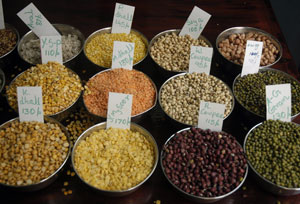 |
| Dhal and green gram have seen a sharp increase in price within just two weeks |
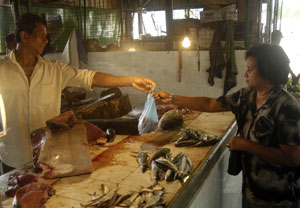 |
| Fish stall: Not many takers |
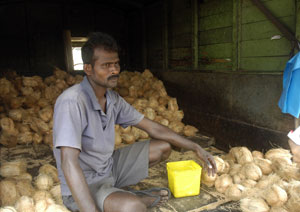 |
| Coconuts cheaper at economic centres, but yet this vendor has hardly any customers |
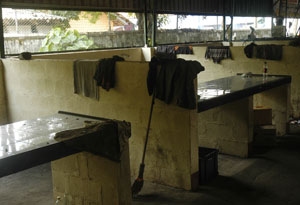 |
| No business at meat stalls |
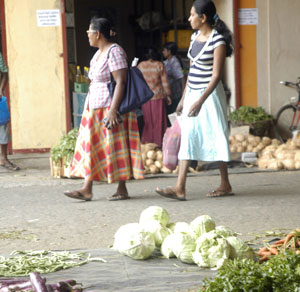 |
| The once buzzing ‘economic centres’ have seen a sharp drop in the number of shoppers. |
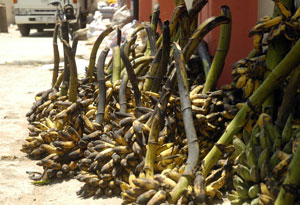 |
| Spoilt bananas thrown away |
|
He said the prices of vegetables such as carrot, pumpkin, beetroot, tomatoes, beans and lime had gone up in the past few weeks following the increase in the Nation Building Levy.
R. Ramesh, a vegetable vendor at the centre said apart from vegetables items the prices of Dhal and Green gram had gone up by about Rs.20- Rs. 30.
“ The dhal we sold at Rs.140 a kg just two weeks ago, is now sold at Rs.170,” he said.
The wholesale price of a coconut had also increased by as much as four rupees but much of that increase has been absorbed by the retailers at the economic centres who are selling the coconuts for two rupees less. Other items such as sugar, tin fish and chillies also saw increases in wholesale and retail prices.
Meanwhile, the once busy fish and meat market has been reduced to one fish stall and one chicken stall with others putting up shutters up due to the drop in the number of consumers.
The supervisor at the fish stall, Thisira said, “Most of my customers who usually purchased 500g of fish earlier are now only buying half that amount due to steep prices.”
Thisira said popular types of fish like seer and tuna had increased by about Rs.200 and Rs.150 respectively while also noticing a significant drop in sales and customers since the New Year period. Chicken prices had also increased from Rs.360 a kg to Rs.380 in the past two weeks.
Fruit vendors at the Welisara economic centre seemed to be the worst affected, being forced to throw away fruits that were rotting because of poor sales.
One fruit vendor who had just got rid of about 20 bunches of rotten plantains complained that many who came to buy essentials such as rice and vegetables invariably purchased fruits as a secondary item.
“Fruit prices have remained the same since the New Year season and the prices depend mainly on fruits season but now since the purchasing power of the consumer has reduced drastically, fruits don’t get sold easily,” he said.
At the busier Narahenpita and Pettah markets many of the traders said they feared that prices of items would go up further later in the month.
The price of rice has increased on average by about Rs.5 to Rs.10 a kg with the price of samba going up by about five rupees and red kekulu by about Rs.4 to Rs.7 in Colombo.
Traders said items such as sprats too had increased by about Rs.50 a kg with the current retail price of Rs. 320 a kg. However, the price of dried fish had not gone up after the festive season increasing its demand marginally.Many traders said after the election the government allowed the prices to soar with the elimination of price caps and the increase in taxes. They said prices of items would go up further by about Rs.5 to Rs.6, by the end of the month.
Meanwhile, an increase in the price of a cylinder of gas by Rs.191 following the Rs.310 decrease before the election came somewhat as a surprise to consumers.
Shell Gas Lanka Ltd (SGLL) Finance Director Rimoe Saldin said their prices were governed by the pricing formula agreed between Shell and the Consumer Affairs Authority. He said the price revision on March 1 was based on the landed cost (total cost of a landed shipment including purchase price, freight, insurance, and other costs up to the port of destination) in December 2008 and January 2009 while the price revision on May 1 was based on the landed cost of February and March 2009.“
The depreciation of the rupee in April-May will increase the landed cost in spite of the current low world market prices. What the ultimate outcome will be cannot be predicted at this stage. However, a price decrease will be possible if the landed cost declines,” he said.
Meanwhile, the Department of Census and Statistics (DCS) reported that the Colombo Consumer Price Index (CCPI) showed a decrease of 0.9 points, signifying a drop of Rs. 162.30 in expenditure on the market basket.
The report issued by the DCS said, “The decrease in the CCPI for March 2009 is mainly due to decrease in prices of rice, potatoes, sea food, eggs, coconut, vegetables, red onion, B’onion and lime”.
This resulted, according to the report, in the decrease of expenditure on food and non-alcoholic beverages by as much as Rs. 222 while the report also mentioned slight increases in prices of sugar, chicken and green chillies.
Despite increases in the prices of rice, fish, coconut, almost all types of vegetables, red onions, lime, sugar, chicken, green chillies and a cylinder of gas, for April, the CCPI has reported a 1.0 index point reduction which represents a Rs.180 drop in the market basket.
Taxes not the way to raise income
Colombo University’s senior economics lecturer, Sirimal Abeyratne, sharing his views said that due to the current global recession many governments around the world were looking into ways and means to provide stimulus packages to ease the burden on the people.
 |
| Sirimal Abeyratne |
However, in Sri Lanka the government appears to have exhausted its options. Government expenditure and income had reached their limits, leaving no room for such packages. The situation has forced the government to raise further income through taxes.
“The government needs finances and this is causing a dilemma. Therefore it is attempting to do this through taxes and this is certainly making things a little more difficult in the process,” he said.
Dr. Abeyratne said the government should instead prune down on unproductive spending on its part and look into how to help the economy and the consumers.
He also said consumers could look forward to a bleak year which would be made worse with development and resettlement projects taking high priority in the government expenditure, after the war comes to an end.
Evening cuppa a luxury
The Sunday Times spoke to the Jayasekera family, an average middle-class family of four in Maharagama, to find out how they were coping, with the cost of living reaching unprecedented heights.
C.G. Jayasekera said his greatest concern was the growing expenditure on essential food items that have increased within the past month or so.
“We spend about Rs. 20,000 on food every month and compared with last month it’s about a 20% increase. Apart from that our water bill and gas have also increased,” he said.
“We try to conserve as much as possible and we have now cutdown on what we consider luxuries like the evening cup of tea. We are forced to trim down in so many other areas too,” he lamented.
|







